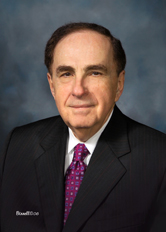 UNMC Chancellor Harold M. Maurer, M.D., has received the Clark-Curran Award in Medical Administration from his alma mater, State University of New York (SUNY) Downstate Medical Center in Brooklyn.
UNMC Chancellor Harold M. Maurer, M.D., has received the Clark-Curran Award in Medical Administration from his alma mater, State University of New York (SUNY) Downstate Medical Center in Brooklyn.
The award, presented April 29 at the 126th Anniversary Alumni Reunion in Brooklyn, recognized Dr. Maurer’s outstanding teaching ability and contributions to medical administration. He is the fifth recipient of the award, which was established in 2002 to recognize alumni who provide leadership and demonstrate achievements in medical administration.
“I am honored to have received this award,” Dr. Maurer said. “My goal, and UNMC’s vision, is to become a world-class institution and, in many ways, we already are, thanks to the hard work of our faculty and staff and our reputation as outstanding researchers, educators and clinicians. As chancellor, I am especially proud of our public and private support, which has propelled us to new heights and benefits the entire state and region.”
Dr. Maurer has served as UNMC chancellor since Dec. 1, 1998.
“Your achievements in the field of administrative medicine are a testament to your hard work, your abilities and to the excellent education you received at Downstate,” said Richard Sadovsky, M.D., president elect of the SUNY Alumni Association Board of Managers.
Dr. Maurer’s tenure at UNMC has been marked by a burst of construction projects from the $77 million Durham Research Center to the $52.7 million Michael F. Sorrell Center for Health Science Education to the $56.8 million Hixson Lied Center for Clinical Excellence to an Aug. 8 groundbreaking ceremony for a $74 million second research tower, in addition to a new parking garage and utility plant.
He also spearheaded UNMC’s merger talks with Clarkson Hospital, which in 1997 led to what is now The Nebraska Medical Center. He also has successfully lobbied for legislation securing a multi-million dollar portion of the state’s tobacco settlement money each year for biomedical research and bolstered UNMC’s national reputation in bioterrorism preparedness. As dean of the UNMC College of Medicine, he consolidated the faculty practice plan into a single 501C organization.
A Brooklyn native, Dr. Maurer received all of his formal education in his hometown. In 1961, he received his medical degree from SUNY Downstate Medical Center, and he completed his pediatric residency and a pediatric hematology-oncology fellowship at Babies Hospital, Columbia-Presbyterian Medical Center in New York.
Dr. Maurer is considered one of the world’s foremost experts on rhabdomyosarcoma, a childhood cancer that involves the soft tissue of the body. He helped form the Intergroup Rhabdomyosarcoma Study Group, which he chaired from 1972 to 1998. The group has been credited with raising the cure rate of children afflicted with the disease from 20 percent to 75 percent.
Dr. Maurer’s academic career began in 1968 at the Medical College of Virginia, and he rose rapidly to the rank of professor. From 1976 through 1993, Dr. Maurer was professor and chairman of the Department of Pediatrics, Children’s Medical Center, Medical College of Virginia. During that time, he received the University Award of Excellence, the highest award at Virginia Commonwealth University; and the Dean’s Award for Outstanding Contributions to the School of Medicine, the highest award at the Medical College of Virginia.
In 1993, he and his wife, Beverly, moved to Omaha when Dr. Maurer became dean of the UNMC College of Medicine. Since then, he has articulated a new vision and strategic plan to become a world-renowned health sciences center, repositioning UNMC from a regional to a national center of excellence in the 21st century.
In addition to aiming to improve the educational performance of students, fostering state-of-the-art patient care, targeting community health and embracing diversity, the plan places major emphasis on becoming a ranking health sciences research center to fuel both educational and clinical programs. It also emphasizes the importance of research as a new economic driver for the state.